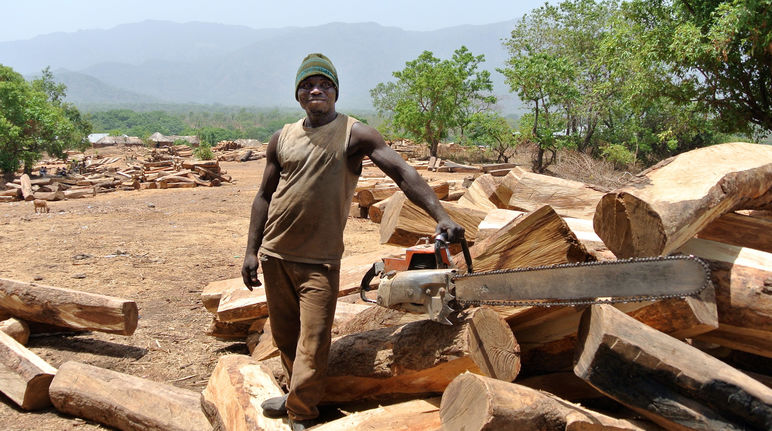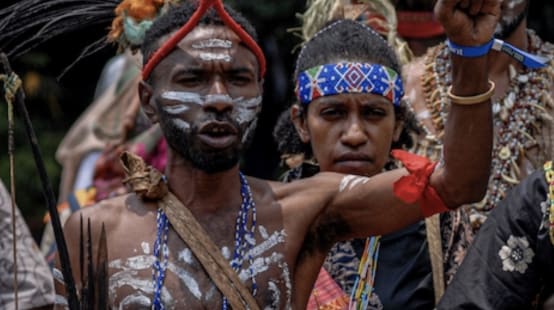Stamp out the illegal rosewood trade!
 Rosewood logs in Nigeria (© Mathias Rittgerott)
Rosewood logs in Nigeria (© Mathias Rittgerott)
10,000 shipping containers of illegal rosewood worth $300 million have made their way to China from Nigeria. The trade was “facilitated” by $1 million in bribes to Nigerian officials and politicians and intervention by the present UN Deputy Secretary-General. International agreements to control the rosewood trade lack teeth.
Call to actionTo: the UN Member States, the CITES Signatory States and the CITES Secretariat
“The UN Deputy Secretary-General has been implicated in the illegal sale of rosewood. The UN must prosecute the criminals behind timber trafficking.”
Traveling through Nigeria’s Taraba state, there’s no overlooking the thousands of logs lying by the side of the road. Pickups transport the rosewood logs from the forest to timber yards, where they are sawn and loaded onto trucks heading for Lagos.
The rosewood leaves West Africa in shipping containers, most of it destined for China. Officially, Nigeria has banned the export – to little effect. International trade is tightly restricted – yet traffickers operate with relative impunity.
The Environmental Investigation Agency (EIA) recently uncovered a particularly egregious case of rosewood trafficking.
Chinese authorities seized no less than 10,000 shipping containers of illegal rosewood. The timber is valued at more than $300 million.
According to the EIA, the Nigerian Ministry of Environment responded by simply issuing the missing documents retroactively. This allowed over 1.4 million illegal logs to be laundered, in violation of both Nigerian laws and the Convention on International Trade in Endangered Species (CITES). The traffickers allegedly bribed senior Nigerian officials – including ministers and members of parliament – with more than US $1 million. The scandal is an impressive illustration of the power wielded by the timber mafia.
The then Minister of Environment, Amina J. Mohammed, appears to have personally signed the fraudulent documents as one of her last actions in office. She is currently serving as the Deputy Secretary-General of the United Nations. Mohammed has since denied the allegations.
Please call on UN Secretary-General António Manuel de Oliveira Guterres to investigate the allegations against Amina J. Mohammed. The international community must prosecute the criminals behind timber trafficking.
BackgroundNigeria is the world’s largest supplier of rosewood, with alarming consequences: the number of rosewood trees has dwindled by 80 percent in only two years!
The largest importer is China, a market that accounted for the felling of 900,000 rosewood trees in 2014 alone. That is the equivalent of 750,000 cubic meters of timber.
Trade in rosewood has increased 15-fold since 2010: In 2009, the trade was valued at $12 million; by 2014, it had exploded to no less than $180 million.
Rosewood trees grow very slowly, needing around 100 years to reach their full height of fifteen meters and a trunk diameter of up to one meter. The trees need to grow for 30 to 40 years to attain a trunk diameter of at least 40 centimeters, at which point they become attractive to loggers.
The Washington Convention on International Trade in Endangered Species (CITES)
183 states have ratified the Convention on International Trade in Endangered Species of Wild Fauna and Flora (CITES, also known as the Washington Convention), which was opened for signatures in 1973 and entered into force in 1975. It is the only binding international agreement that aims to protect rare species. Its implementation is often inefficient, however. Criminal gangs traffic in endangered species and sell the wood of millions of illegally felled trees with relative ease. Governments can hardly stem the trade with their outdated and inefficient control instruments. Environmentalists therefore demand more effective enforcement of the agreement. This would include a transparent electronic information system to enable action against traffickers in real time.
Support for EIA report
Rainforest Rescue supported EIA's reporting with photos taken in Nigeria. One of the images was also published by by the French daily newspaper, Le Monde.
To: the UN Member States, the CITES Signatory States and the CITES Secretariat
Dear Mr. Secretary-General,
Ladies and Gentlemen,
The international rosewood trade is subject to tight restrictions: Pterocarpus erinaceus is listed in Annex 2 of the Convention on International Trade in Endangered Species CITES and is classified as “threatened” on the IUCN Red List. Nevertheless, the logging of rosewood for export in West Africa has reached a scale that threatens the species with extinction in the near future.
An NGO, the Environmental Investigation Agency (EIA), recently uncovered a particularly egregious case of rosewood trafficking: Chinese authorities seized 10,000 shipping containers of rosewood valued at $300 million. The timber, which had originated in Nigeria, lacked documents proving its legality.
According to the EIA report, Nigeria’s Ministry of Environment issued the missing documents retroactively. The export of the logs is a clear violation of Nigerian laws and thus violates the legality principle of CITES. The export of listed species without valid CITES documents is also a clear violation of CITES rules.
The Nigerian Minister of Environment at the time the documents were issued was Amina J. Mohammed, the current United Nations Deputy Secretary-General.
Mr. Secretary-General, we call on you to investigate the allegations against Ms. Mohammed.
Ladies and gentlemen, CITES is too weak to prevent such scandals and must be strengthened. Please take measures to combat illegal logging and timber trafficking effectively.
Yours faithfully,













 Recent successes
Recent successes